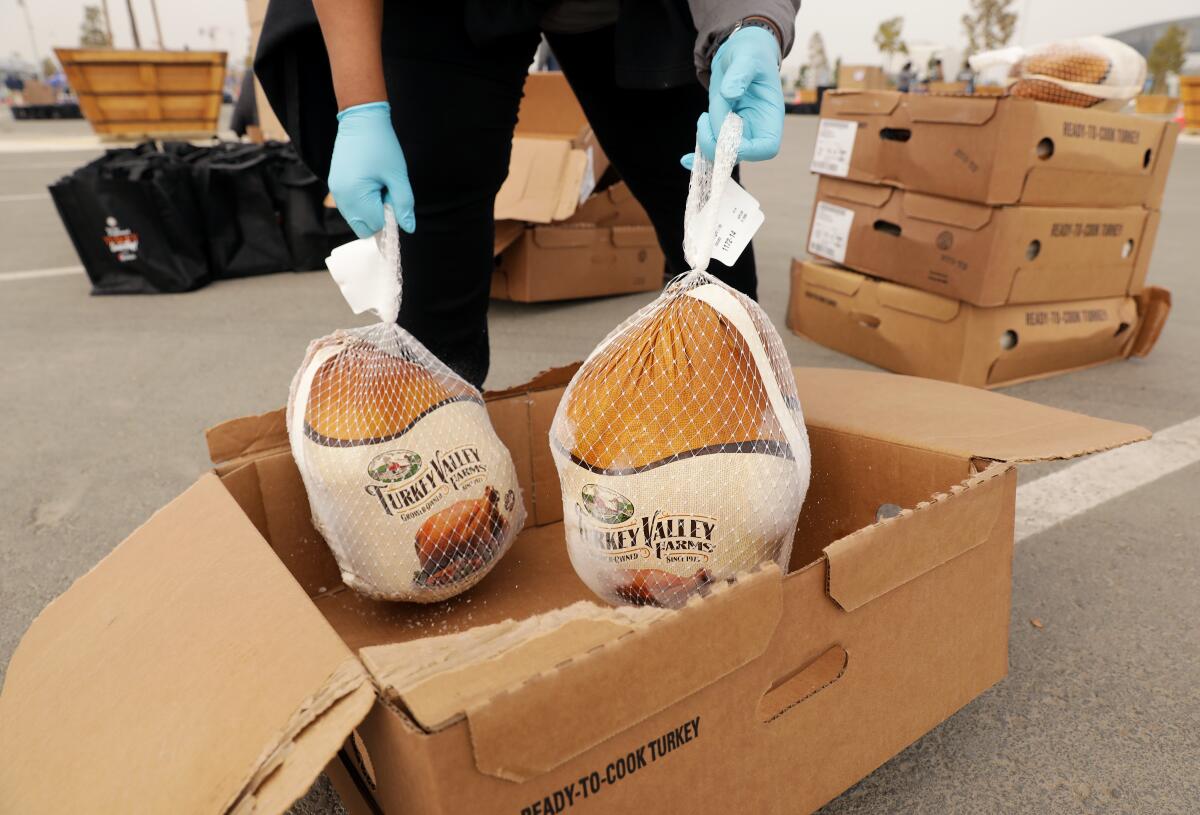Yes, even in 2020 there are reasons to give thanks

- Share via
How do we give thanks in a year like 2020, when even our ability simply to sit down with friends and family on the fourth Thursday in November and dig in to a sumptuous feast is an exercise in risk management?
This year has objectively been the toughest for the U.S. in recent history, and it’s not over yet. 2020 began with the arrival of a plague that our unprepared country met with dangerous ineptitude, leading to incalculable human loss and suffering. Midway through, catastrophic fires in the West underscored the fact that we are losing the climate change race. The terribleness was punctuated by massive civil unrest driven by unresolved structural racism, political division so deep that people maimed and killed one another over face masks, and an extraordinarily antagonistic presidential campaign that continues somehow to this day. And now as we head deeper into the holiday season, with the virus surging again and more shutdowns looming, millions of jobless Americans are about to run out of unemployment benefits.
Yes, it’s dark times indeed, but as Americans sit down alone or in small groups of family for the annual Thanksgiving meal, there are still reasons to raise a glass and count blessings (and not just that 2020 will be over soon).
Foremost is the fact that the COVID-19 pandemic hasn’t been worse. This is not to diminish the deaths of more than 260,000 people in the U.S. and 1.4 million around the globe. But remember, last winter scientists worried that this novel coronavirus could be extremely deadly, like its recent cousin viruses — SARS and MERS — and could kill many millions of people before it was brought under control.
That it wasn’t the plague on the scale with our worst fears is not only due to the nature of SARS-CoV-2, which is more contagious but less lethal than its precursors, but also because of the work of so many people who cared for the sick when most people were hunkering down at home. That includes the doctors and nurses, of course, but also the underappreciated healthcare workers toiling for low pay in nursing homes, clinics and other facilities who kept coming to work even when they lacked adequate protective gear and knew it could cost them their lives. Indeed, for many hundreds of healthcare workers, it did. We are grateful for their sacrifice, as well as that of the other unsung heroes of the pandemic: grocery store clerks, delivery drivers, test-site staffers and too many others to list whose work put them in harm’s way.
Even the bad news can be the source of gratitude if it leads to positive change. Calamity has a way of clarifying what’s most important (hugging loved ones, political stability and — who knew? — toilet paper) and forcing us to face hard truths. This year, the pandemic revealed that an employment-based healthcare system can crumble when it’s most needed; that warehousing our elderly is not just unkind but deadly; that our social safety nets have been dangerously frayed by the complacency of a long economic expansion; and that policies that perpetuate racial and economic disparity are still deeply embedded in our society. Acknowledging the things that are broken is the first step in fixing them.
And if nothing else, this would be the year to thank science and scientists who have, once again, served humanity, despite ruthless rhetorical attacks from those who didn’t wish to hear the truth about the virus. In a matter of months, virologists, epidemiologists and immunologists, among many others, developed crucial knowledge to fight the pandemic and produced several promising vaccine candidates.
It gives us real hope that by this time next year we will be free again to gather in large and joyous groups, to sing loudly without fear, to simply embrace and hold close those people who haven’t been lost in this bad, bad year. That will be a Thanksgiving to remember.
More to Read
A cure for the common opinion
Get thought-provoking perspectives with our weekly newsletter.
You may occasionally receive promotional content from the Los Angeles Times.









